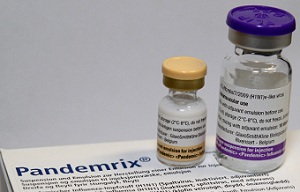Though the European Medicines Agency declared last October that links between spikes in narcolepsy in European countries and a swine flu vaccine distributed in 2009 are insufficient, some experts still assert that the shot is to blame, and compelling evidence is growing. The EMA will continue to welcome researchers' work on the topic as it gets to the bottom of the situation.
 |
| Pandemrix--courtesy of Wikipedia Commons |
More than 30 million people in 47 countries received GlaxoSmithKline's ($GSK) Pandemrix, a flu vaccine containing an adjuvant not used in the United States. And now 795 people across Europe have reported developing narcolepsy since the vaccine hit the market in 2009, Reuters reports. Finland, Norway, Ireland, France and Sweden all saw spikes in the sleep disorder, and Britain will likely follow when a study is published in coming weeks.
So far, the European Medicines Agency says data presented by the Finnish National Institute of Health and Welfare are preliminary and do not allow for conclusions--a link between narcolepsy and Pandemrix is still an unknown. But the regulatory agency said GSK should take the hypothesis into account, and the shot is no longer available in the EU. The agency said the vaccine should only be used in individuals under 20 if no other annual trivalent flu vaccine is available and immunization against H1N1 is necessary.
While the evidence is still not conclusive, some experts are reading between the lines. Emmanuel Mignot, one of the world's leading experts on narcolepsy based at Stanford University, told Reuters that he believes that Pandemrix is to blame for the uptick in narcolepsy cases.
"There's no doubt in my mind whatsoever that Pandemrix increased the occurrence of narcolepsy onset in children in some countries--and probably most countries," he told the news service.
GSK provided funding to Mignot to investigate the situation further. Norman Begg, chief medical officer of GSK's vaccines division, told Reuters that the company plans to figure out just what's going on, but he said evidence does not yet suggest a link. Peer-reviewed studies in Sweden, Finland and Ireland show that the risk of developing narcolepsy after the 2009-2010 immunization campaign was 7 and 13 times higher respectively for children who received Pandemrix than those who did not.
"We really do want to get to the bottom of this. It's not in anyone's interests if there is a safety issue that needs to be addressed," Begg said, as quoted by Reuters.
Experts in Finland first voiced concern about a potential connection between the shot and narcolepsy in 2011.
- read the EMA release
- get more from Reuters